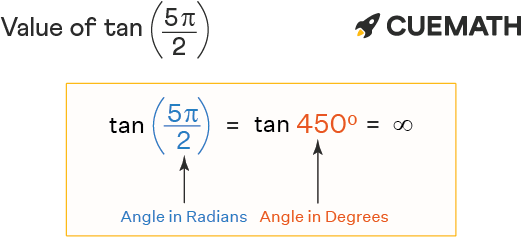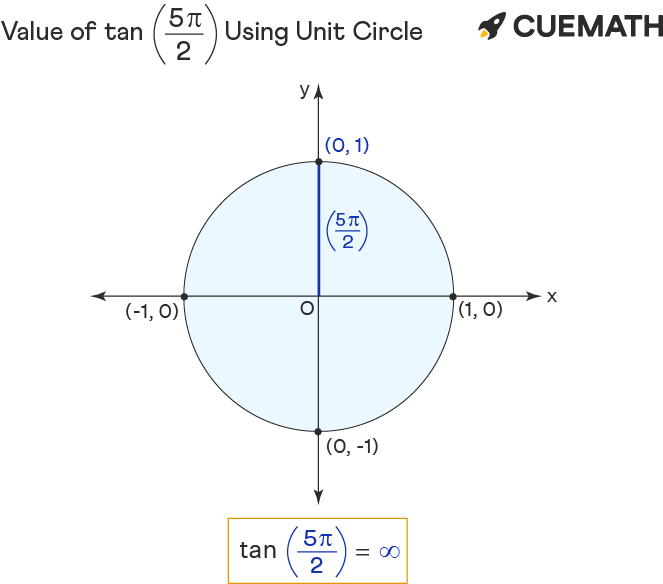Tan 5pi/2
The value of tan 5pi/2 is not defined. Tan 5pi/2 radians in degrees is written as tan ((5π/2) × 180°/π), i.e., tan (450°). In this article, we will discuss the methods to find the value of tan 5pi/2 with examples.
- Tan 5pi/2: not defined
- Tan (-5pi/2): not defined
- Tan 5pi/2 in degrees: tan (450°)
What is the Value of Tan 5pi/2?
The value of tan 5pi/2 is not defined. Tan 5pi/2 can also be expressed using the equivalent of the given angle (5pi/2) in degrees (450°).
We know, using radian to degree conversion, θ in degrees = θ in radians × (180°/pi)
⇒ 5pi/2 radians = 5pi/2 × (180°/pi) = 450° or 450 degrees
∴ tan 5pi/2 = tan 5π/2 = tan(450°) = not defined

Explanation:
For tan 5pi/2, the angle 5pi/2 > 2pi. We can represent tan 5pi/2 as, tan(5pi/2 mod 2pi) = tan(pi/2). For tan 5pi/2, the angle 5pi/2 lies on the positive y-axis. Thus, tan 5pi/2 value = not defined
Since the tangent function is a periodic function, we can represent tan 5pi/2 as, tan 5pi/2 = tan(5pi/2 + n × pi), n ∈ Z.
⇒ tan 5pi/2 = tan 7pi/2 = tan 9pi/2 , and so on.
Note: Since, tangent is an odd function, the value of tan(-5pi/2) = -tan(5pi/2) = not defined.
Methods to Find Value of Tan 5pi/2
The value of tan 5pi/2 is given as not defined. We can find the value of tan 5pi/2 by:
- Using Unit Circle
- Using Trigonometric Functions
Tan 5pi/2 Using Unit Circle

To find the value of tan 5pi/2 using the unit circle, represent 5pi/2 in the form (1 × 2pi) + pi/2 [∵ 5pi/2>2pi] ∵ The angle 5pi/2 is coterminal to pi/2 angle and also tangent is a periodic function, tan 5pi/2 = tan pi/2.
- Rotate ‘r’ anticlockwise to form pi/2 or 5pi/2 angle with the positive x-axis.
- The tan of 5pi/2 equals the y-coordinate(1) divided by the x-coordinate(0) of the point of intersection (0, 1) of unit circle and r.
Hence the value of tan 5pi/2 = y/x = not defined
Tan 5pi/2 in Terms of Trigonometric Functions
Using trigonometry formulas, we can represent the tan 5pi/2 as:
- sin(5pi/2)/cos(5pi/2)
- ± sin(5pi/2)/√(1 - sin²(5pi/2))
- ± √(1 - cos²(5pi/2))/cos(5pi/2)
- ± 1/√(cosec²(5pi/2) - 1)
- ± √(sec²(5pi/2) - 1)
- 1/cot(5pi/2)
Note: Since 5pi/2 lies on the positive y-axis, the final value of tan 5pi/2 is not defined.
We can use trigonometric identities to represent tan 5pi/2 as,
- cot(pi/2 - 5pi/2) = cot(-2pi)
- -cot(pi/2 + 5pi/2) = -cot 3pi
- -tan (pi - 5pi/2) = -tan(-3pi/2)
☛ Also Check:
Examples Using Tan 5pi/2
-
Example 1: Find the value of tan 5pi/2 if cot 5pi/2 is 0.
Solution:
Since, tan 5pi/2 = 1/cot(5pi/2)
⇒ tan 5pi/2 = 1/0 = not defined -
Example 2: Using the value of tan 5pi/2, solve: (sec²(5pi/2) - 1).
Solution:
We know, (sec²(5pi/2) - 1) = (tan²(5pi/2)) = not defined
⇒ (sec²(5pi/2) - 1) = not defined -
Example 3: Find the value of 4 tan(5pi/2)/6 tan(pi/4).
Solution:
Using trigonometric values, we know, tan(5pi/2) = not defined and tan(pi/4) = 1.
⇒ Value of 4 tan(5pi/2)/6 tan(pi/4) = not defined

FAQs on Tan 5pi/2
What is Tan 5pi/2?
Tan 5pi/2 is the value of tangent trigonometric function for an angle equal to 5π/2 radians. The value of tan 5pi/2 is not defined.
What is the Value of Tan 5pi/2 in Terms of Cosec 5pi/2?
Since the tangent function can be represented using the cosecant function, we can write tan 5pi/2 as 1/√(cosec²(5pi/2) - 1). The value of cosec 5pi/2 is equal to 1.
How to Find the Value of Tan 5pi/2?
The value of tan 5pi/2 can be calculated by constructing an angle of 5π/2 radians with the x-axis, and then finding the coordinates of the corresponding point (0, 1) on the unit circle. The value of tan 5pi/2 is equal to the y-coordinate(1) divided by the x-coordinate (0). ∴ tan 5pi/2 = not defined
What is the Value of Tan 5pi/2 in Terms of Sin 5pi/2?
Using trigonometric identities, we can write tan 5pi/2 in terms of sin 5pi/2 as, tan(5pi/2) = sin(5pi/2)/√(1 - sin²(5pi/2)) . Here, the value of sin 5pi/2 is equal to 1.
How to Find Tan 5pi/2 in Terms of Other Trigonometric Functions?
Using trigonometry formula, the value of tan 5pi/2 can be given in terms of other trigonometric functions as:
- sin(5pi/2)/cos(5pi/2)
- ± sin(5pi/2)/√(1 - sin²(5pi/2))
- ± √(1 - cos²(5pi/2))/cos(5pi/2)
- ± 1/√(cosec²(5pi/2) - 1)
- ± √(sec²(5pi/2) - 1)
- 1/cot(5pi/2)
☛ Also check: trigonometric table
visual curriculum